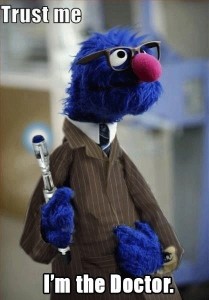While they shouldn’t be, doctors’ offices can be intimidating to a lot of people. And to those of us who live with and love Asperkids, it can be very hard to—on cue—be able to articulate why our obviously brilliant children are NOT just “anxious and highly gifted.” Do NOT allow your instincts to be dismissed—highly intelligent, articulate kids (ESPECIALLY girls) are the most like to be under-or mis-diagnosed, leading to years of heartache and wounded self-esteem.
Before you go to an evaluation, write out as many specific examples of the following behaviors–read each aloud and offer to leave a copy behind. You may also wish to leave a copy with any teachers who are filling out forms–your notes often will jog their memories. Last—insist on “critiquing” your kiddo OUTSIDE of his/her presence. Clinicians sometimes forget that theirs isn’t the first (or last) you’ll visit—and no one needs to hear repeated lists of their own personal challenges.
Here’s what to make note of:
- ticking: eye squinting or blinking, finger flicking, biting or picking at lips, smacking or licking lips, licking or mouthing non-food items, running or spinning in circles, repeating words or sounds for no apparent reason
- touching – other people, objects, etc without regard for “personal space”
- specific instances of being very upset by changes in routine (like not watching a show at a particular time, a change in classroom arrangement, even in her “spot” at the dinner table or class rug)
- generalized anxiety and prolonged separation anxiety, extreme concern with getting things just right or having objects just so – opening and closing doors, garbage can lids, cabinets, the length of sleeves, the order of displayed collectibles)
- scripting: directly quoting tv or movies and/or expecting others to play exactly as the story went
- not really knowing how to collaboratively, interactively, spontaneously “play” when given freedom to do so (ESP in a new place or with other kids); preference for the company of older kids, adults or much younger children
- rule police – upset when others break rules, correcting peers without understanding the consequences
- interrupting frequently without really meaning to be ride
- knowing a professorial amount of facts about something (trains, history, mermaid lore, etc)
- talking about that topic at length even when others’ body language cue that they are not interested
- rigid thinking – inability/extreme difficulty in compromising, considering alternative plans or solutions, or “going with the flow” when plans change
- sensitivity to noise, tags, movement, crowds, unexpected touch, clothing textures
- lack of reciprocity in conversations; being unaware of the “natural give and take” in relationships and dialogue
- not discerning between “friendly” and “friend”
- bluntly (or refreshingly!) honest – but can be perceived as self-centered, rude or arrogant, even though is actually compassionate and sensitive
- difficulty seeing or truly understanding others’ perspective
- has a hard time shifting attention from one task or activity to another without getting upset, confused or overwhelmed
- organizational struggles – extreme distractability/gets off-task quickly and repeatedly
- wants to be included but can’t figure out how to join in OR how to maintain friendships
- much more comfortable with “facts than with folks”
Be prepared with very specific examples and expect to have to fill out lots of forms. Hope this helps you to be the best advocate for that precious,’ precocious kid who’s depending upon you. Xoxo, j
Jennifer Cook O’Toole is the author of Asperkids: An Insider’s Guide to Loving, Understanding and Teaching Children with Asperger Syndrome (2012), The Asperkid’s (Secret) Book of Social Rules: The Handbook of Not-So-Obvious Social Guidelines for Tweens and Teens with Asperger Syndrome (2012), and the forthcoming The Asperkid’s Launch Pad: Home Design to Empower Everyday Superheroes (April 2013) all published by Jessica Kingsley Publishers.
To learn more about Jennifer, the Asperkids series and to read her original post, please visit her website: Asperkids.
